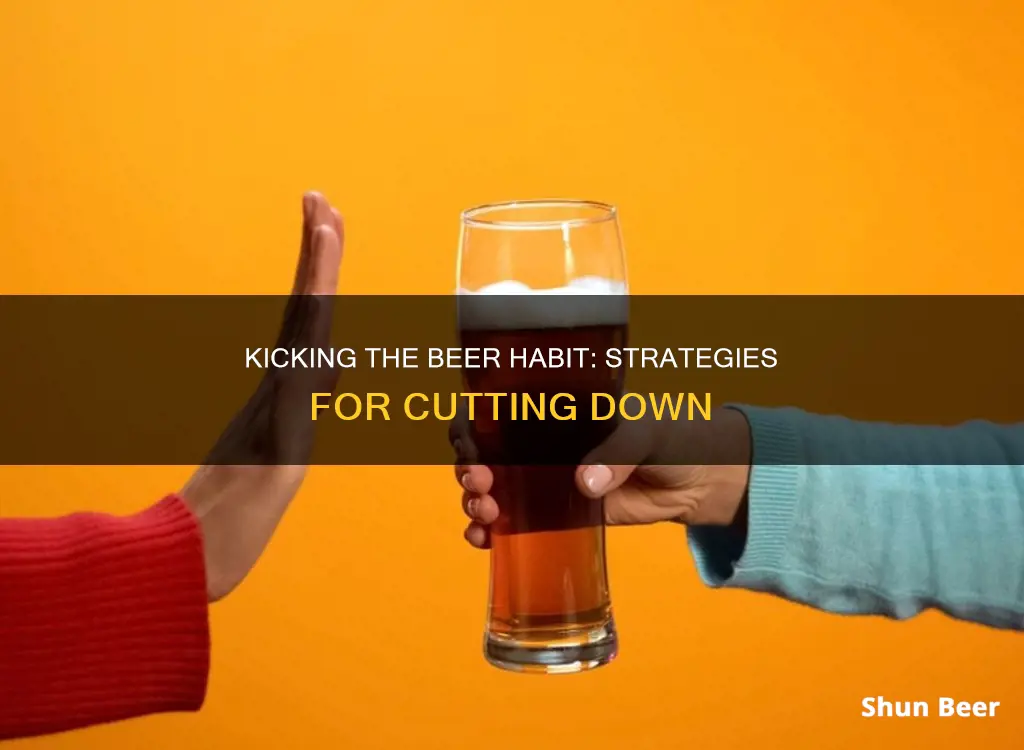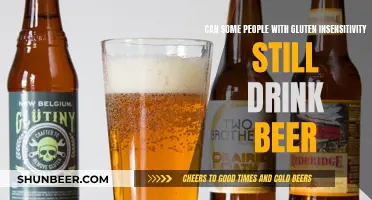
Drinking too much beer can be a cause for concern, and it's important to know when to cut back or quit. Excessive alcohol consumption can lead to health issues, including high blood pressure, heart disease, and an increased risk of certain cancers. It can also affect your sleep, weight, and mental health. If you're drinking more than 14 units of alcohol per week, which is equivalent to 6 pints of beer, it's time to re-evaluate your drinking habits. Here are some strategies to help you stop drinking so much beer:
- Understand your relationship with alcohol: Recognize why you drink and identify triggers that lead you to drink.
- Set a drinking goal: Determine how much you want to cut back and stick to it.
- Keep a drinking diary: Track your drinking habits for a few weeks to gain insight into your consumption patterns.
- Remove alcohol from your environment: Get rid of alcohol in your house to reduce temptation.
- Choose alcohol-free days: Commit to not drinking for a day or two each week to gradually reduce your intake.
- Practice saying no: Prepare yourself to politely decline drinks in social situations.
- Find alternative beverages: Opt for non-alcoholic drinks like water, flavored sodas, or tea instead of beer.
- Stay busy and active: Engage in activities, hobbies, or sports to distract yourself and reduce the urge to drink.
- Seek professional help if needed: If you're unable to cut back on your own, consider reaching out to a healthcare professional or joining a support group.
Remember, it's okay to ask for help, and it may be dangerous to quit drinking cold turkey if you're physically dependent on alcohol. Always consult a doctor or specialist if you're concerned about your drinking habits or experiencing withdrawal symptoms.
| Characteristics | Values |
|---|---|
| Understand your relationship with alcohol | Identify why you drink and how much you drink |
| Set clear and realistic goals | Define your goals, such as improved physical health, mental clarity, or stronger relationships |
| Build a support system | Surround yourself with supportive family and friends, or join a community or local support group |
| Find alternatives | Explore non-alcoholic alternatives, such as mocktails and alcohol-free beers |
| Develop healthy habits | Incorporate exercise, mindfulness, and a balanced diet into your routine |
| Understand your triggers | Identify times, places, and emotions that trigger your drinking |
| Structure your daily plan | Create a well-designed daily routine with purposeful and positive activities |
| Celebrate milestones | Acknowledge and celebrate your progress and achievements |
| Seek professional help | Consult a healthcare professional, therapist, or support group if needed |
What You'll Learn

Understand your relationship with alcohol
Understanding your relationship with alcohol is a key first step in reducing your beer consumption. Here are some ways to gain a deeper understanding:
Identify your reasons for drinking
Ask yourself why you drink. Are there certain situations, emotions, or people that trigger your desire to drink? For example, do you drink when you're feeling happy, anxious, or stressed? Do you drink when you're alone or with friends? Identifying your triggers can help you explore alternative ways to address these issues more productively.
Recognise the health effects of alcohol
Examine the impact of alcohol on your physical and mental health. Alcohol can affect your health in numerous ways, even when consumed in moderate amounts. It can leave you feeling groggy, foggy, or hungover. Excessive drinking can increase anxiety, depression, irritability, and conflict with loved ones. It can also disrupt your sleep patterns, impair your judgement and behaviour, and affect your cognitive abilities and emotional well-being. Understanding the negative consequences of alcohol on your health can provide motivation to cut down or quit drinking.
Evaluate your drinking habits
Keep a diary of your drinking habits for a few weeks. Record the amount you drink, the type of beverage, and the situations or triggers that led to drinking. Compare this to recommended drinking guidelines. For context, Drinkaware guidelines advise that it is safest not to drink more than 14 units of alcohol per week, which equates to 6 medium glasses of wine or 6 pints of beer. Evaluating your drinking habits can help you set realistic goals and identify areas where you need to make changes.
Understand the signs of alcohol addiction
Recognise the signs of alcohol addiction and withdrawal. If you find yourself drinking more than intended, experiencing cravings, or continuing to drink despite negative consequences, you may be struggling with alcohol addiction. Understanding the signs can help you seek appropriate support and treatment if needed.
Seek professional help if needed
If you feel that you are unable to control your drinking habits on your own, don't hesitate to seek professional help. Consult a healthcare professional, therapist, or support group. They can provide guidance, treatment options, and support throughout your journey to reduce or quit drinking.
Mixing Beer and Vodka: A Safe Night Out?
You may want to see also

Identify triggers and develop a strategy to manage them
Identifying triggers is a critical step in the journey to sobriety. By understanding the situations, emotions, or people that prompt the desire to drink, you can develop strategies to avoid or cope with these triggers.
To identify triggers, it can be helpful to keep a journal and track instances when the urge to drink arises. By recognizing patterns, you can take proactive steps to avoid or minimize exposure to these triggers. For example, if certain social events consistently lead to excessive drinking, it may be necessary to decline invitations or find alternative activities that do not involve alcohol.
- Stress – One of the most common triggers for drinking is stress. To manage this trigger, it is important to find healthy ways to cope with stress and emotions. This may include engaging in regular exercise, pursuing hobbies or creative outlets, practicing mindfulness or meditation, or seeking support from friends and family.
- Social gatherings – Social events or gatherings where alcohol is present can be a strong trigger. To manage this, you can bring a trusted support person with you to events where alcohol is served. It is often easier to turn down a drink when you have moral support. You can also suggest alternative activities to your friends that do not involve drinking, such as going to the movies, playing sports, or trying out a new hobby together.
- Specific environments – Certain environments or places can also trigger the urge to drink. For example, if you associate drinking with holidays or vacations, develop a plan for managing these situations in advance. This may include choosing alcohol-free drinks, drinking slowly, and alternating alcoholic drinks with non-alcoholic ones.
- Internal triggers – Internal triggers are more puzzling because the urge to drink seems to "pop up" out of nowhere. However, if you pause to think about it, you may find that the urge was set off by a fleeting thought, a positive or negative emotion, or a physical sensation. To manage internal triggers, it is helpful to track and analyze your urges to drink. This will help you become more aware of when and why you experience urges, and develop ways to avoid or control them.
- Peer pressure – It can be challenging to say no when others are drinking, especially if you feel obligated to accept a drink when offered. To manage this trigger, practice ways to say no politely. Stay away from people who encourage you to drink, and surround yourself with positive influences who support your decision to cut back or quit.
Remember, it is important to have a plan to manage triggers and avoid relapse. This may include setting specific, measurable, achievable, relevant, and time-bound (SMART) goals, building a supportive network, and seeking professional help if needed.
Mixing Beer and Wine: What's the Harm?
You may want to see also

Set clear and realistic goals
Setting clear and realistic goals is an important step in the journey to stop drinking beer. It is crucial to define your goals and what you hope to achieve by giving up alcohol. This could include improved physical health, mental clarity, stronger relationships, or increased productivity. Having clear objectives will guide you throughout the process and help you stay motivated.
- Understand your drinking habits: Start by assessing your current drinking patterns and habits. Keep a diary of your drinking for three to four weeks. Record what and how much you drink, as well as the locations and situations in which you drink. This will help you identify any triggers or patterns associated with your drinking.
- Set specific and measurable goals: Instead of just saying, "I want to drink less beer," set a specific and measurable goal. For example, you could aim to reduce your beer consumption to a certain number of drinks per week or per month. Make sure your goal aligns with recommended drinking guidelines: no more than one standard drink per day for women and men over 65, and no more than two standard drinks per day for men under 65.
- Create a plan: Develop a strategy to help you achieve your goals. This could include finding alternative beverages, avoiding triggers, and changing your routine. For example, you might decide to switch to non-alcoholic beers or mocktails, avoid places that trigger your urge to drink, or take up a new hobby to distract yourself.
- Set short-term and long-term goals: It's important to set both short-term and long-term goals. Short-term goals will help you stay motivated and celebrate small victories along the way. For example, you might set a goal to go one week without beer and then gradually increase the duration. Long-term goals will keep you focused on the bigger picture and the ultimate benefits you hope to achieve.
- Make your goals visible: Write down your goals and put them somewhere you can see them every day. This will serve as a constant reminder of your commitment and help keep you accountable. You could also share your goals with a trusted friend or family member who can support and motivate you.
- Be flexible and adjust as needed: Remember that your goals may evolve as you progress in your journey. Be open to adjusting your goals as you learn more about yourself and your relationship with alcohol. If you find a particular strategy isn't working, don't be afraid to try something different.
By setting clear and realistic goals, you'll have a solid foundation for your journey towards reducing your beer consumption and improving your overall well-being.
Antibiotics and Alcohol: Is Beer Safe During Treatment?
You may want to see also

Build a support system
Building a support system is a crucial step in your journey to stop drinking so much beer. Here are some ways to build a strong support system:
- Surround yourself with family and friends: Inform your loved ones about your decision to cut back on drinking. They can provide encouragement, support, and accountability. By sharing your goals with them, you'll have a network of people who understand your journey and can offer help during challenging times.
- Join support groups: Consider joining local support groups or communities where you can connect with individuals who share similar goals and experiences. This can be incredibly beneficial as you navigate your path to reducing alcohol consumption. Support groups provide a sense of community, understanding, and shared motivation.
- Seek professional help: If needed, don't hesitate to reach out to healthcare professionals, therapists, or support groups. They can provide valuable guidance, treatment options, and tools to help you manage your drinking habits effectively. Remember, asking for help is a sign of strength.
- Find sober companions: Consider bringing along a trusted sober companion when attending social events or gatherings where alcohol is present. It's often easier to decline a drink when you have the support and company of someone who understands your commitment to sobriety.
- Connect with sober communities: Reach out to sober communities or individuals who have successfully reduced their alcohol consumption. They can offer valuable insights, encouragement, and alternative social activities that don't revolve around drinking.
Remember, building a support system is about surrounding yourself with people who will uplift and motivate you throughout your journey. It's okay to be selective about who you include in your support system, choosing only those who respect your decisions and actively contribute to your well-being.
Beer After Freezing: Still Drinkable or Best Avoided?
You may want to see also

Find healthier alternatives to drinking
Kombucha
Kombucha is a fermented drink made from tea, sugar, bacteria, and yeast. It has antioxidants and antibacterial properties, and is a great source of probiotics, which support gut health and have been linked to longevity. It comes in various fruity flavours, such as ginger lemon, raspberry, and passionfruit, and has a similar fizziness to beer.
Ginger Beer or Ale
Ginger beer and ginger ale are low-calorie alternatives to beer. They have a similar taste and appearance to beer, but with less fizz. Ginger root contains compounds that may help prevent inflammation and protect against cellular damage, which could support liver health.
Mocktails
Non-alcoholic cocktails are a great alternative when drinking in a bar. Most places offer alcohol-free alternatives to famous cocktails, such as the Mojito, Lemon Drop, and Bloody Mary. However, these drinks often contain a lot of sugar, which can be addictive and lead to insulin resistance and fatty liver.
Matcha Tea
Matcha tea is made from green tea leaves that are stone-ground into a soft powder. It contains L-theanine, a compound that increases GABA, a relaxation neurotransmitter. It also has high levels of chlorophyll and amino acids, and can protect heart health and enhance weight loss.
Sparkling Water with Fruit
A simple yet effective alternative, sparkling water with a slice of fruit such as grapefruit, lime, or berries is a delicious and hydrating option.
Alcohol-Free Beers and Spirits
Alcohol-free beers and spirits are widely available and can be a fun way to join in with social drinking occasions without the negative effects of alcohol.
De-alcoholized Wine
De-alcoholized wine goes through the same fermentation process as regular wine, but then has the alcohol removed. It still retains its flavour, body, and colour, and has all the health benefits of regular wine, without the hangover!
Understanding the Working of a Cup Beer Dispenser
You may want to see also
Frequently asked questions
If you're regularly drinking more than 14 units of alcohol a week (equivalent to 6 pints of average-strength beer), then you may be drinking too much. Signs that you're drinking too much beer include digestive issues, anxiety, and sexual health problems.
Drinking less beer can lead to improved physical and mental health. You may find that you have more energy, sleep better, and lose excess weight. You may also experience improved digestion and reduced anxiety.
Try setting a drinking goal, keeping a diary of your drinking, avoiding alcohol-free drinks, and choosing lower-strength drinks. You can also try having several drink-free days each week and making sure you don't keep alcohol in your house.
If you think you may be dependent on alcohol, it's important to consult your doctor or another health professional. They can help you determine the best course of action and provide support throughout the process.







